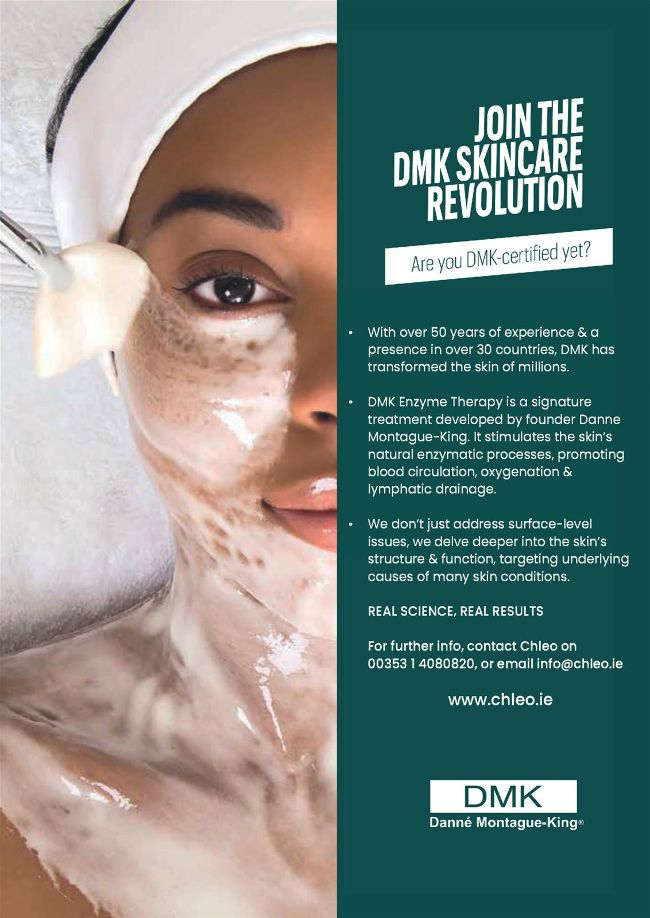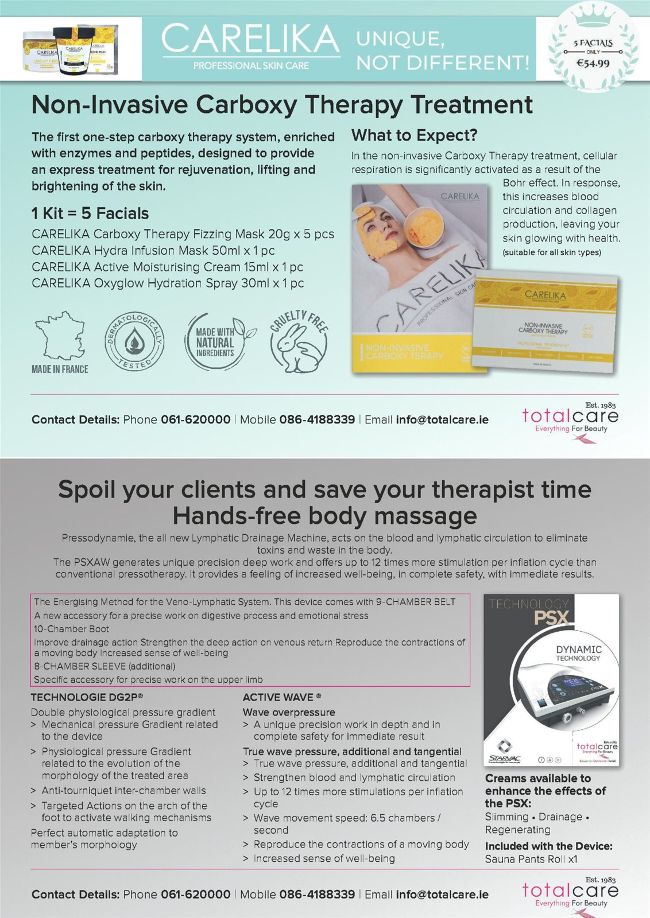Climate CHANGE
As skincare needs change during the colder months, here is everything you need to know to help clients adapt their regimes
We make many lifestyle changes during the colder months, so it makes sense that skincare regimes should also be adapted at this time of the year.
“Winter can significantly affect skin health due to a combination of factors,” says Andrea O’Donnell, national educator at DIBI Milano UK & Ireland. “For instance, central heating systems, including forced air, radiators and space heaters, reduce indoor humidity levels, which can dry out the skin. This makes it dehydrated and more prone to cracking and irritation. Less exposure to sunlight in the winter months can reduce vitamin D synthesis in the skin. Vitamin D is crucial for skin health and immune function. Those with eczema may experience more frequent or severe flare-ups in the winter due to the combination of dry air and irritants.”

“Cranking the heat up indoors also strips away important oils, leading to itchy, sensitive and reactive skin,” notes Adela Farrelly, Eminence trainer at The Wicklow Street Clinic in Dublin. “Our barrier becomes damaged, preventing it from locking in the moisture we need for it remain soft and smooth. Oilier skin types also experience dryness and flakiness.”
“When the temperatures are warmer in the summer, the skin holds its natural moisture better, but the winter months bring on harsher conditions and the skin reacts by becoming more dry, flaky and itchy,” says Lindsay O’Byrne, Mila d’Opiz educator.
“The wind can be fierce in Ireland during the winter, and this can cause broken capillaries and impaired skin barriers,” says Meghan Kiely, national trainer with DMK. “From season to season, clients will notice a change in their skin, therefore their concerns will also change, and therapists need to be ready to update the services they provide,” explaisns Louise O'Loughlin, owner of Iguazu Beauty in Rush, Co Dublin and Repêchage educator.
“Professionals can get stuck in a rut and continue to just ‘rinse and repeat’, without addressing the actual problem. Many external and internal factors affect the skin at this time of the year. Stress can be a huge one as the more relaxed months of summer come to an end. I often see clients with a build-up in congestion. Sometimes they have been using suncreams and tanning products that are not ideal for the face.
“Also, they can neglect their skincare routines over the summer months. Similar to the way clients go back to the gym in September, autumn/winter can be an ideal time for them to reset their skincare routines.”
Diet matters
Diet plays a significant role in maintaining healthy skin, especially during the colder months, according to O’Donnell. “Highwater content foods such as cucumbers, tomatoes, oranges, berries and leafy greens help keep the skin hydrated. Avocados are rich in healthy fats and vitamins E and C, which help maintain skin elasticity and hydration. Blueberries, strawberries and raspberries are rich in antioxidants that protect the skin from free radical damage.”
“Certain superfoods can improve the complexion of the skin, and even smooth its surface,” says Farrelly. “Omega-3-rich fish such as salmon can boost the skin’s moisture levels. It is also a good idea to reduce sugar intake as sugar damages the skin through a process called glycation, resulting in a hard shiny skin surface, discolouration, cross-hatch lines around the lip line and sagging through the jowels. Excess sugar, dairy and alcohol, particularly during the festive season, can contribute to skin issues such as breakouts and psoriasis.”
Supplements can also help boost skin health. “They are as important as topical skincare as they are designed to target the skin all over the body,” says Kiely.
“In my experience, some clients who use vitamin A on their skin during these colder months can get a negative response, so I would advise they take vitamin A supplements as this can help build it up in the skin, resulting in less irritation,” notes O’Loughlin.
In-salon treatments
Adapting your facial offerings in winter can be good for both your clients’ skin health and your business. “Professional treatments should be changed slightly, although it’s always best to customise your treatments to suit each client,” says Kiely. “Winter facials are a great marketing tool, but they shouldn’t be the same for everyone. Offer the same time in the treatment room, but customise it to suit the client’s needs. For instance, in winter, you can include more massage during the facial. And as there are less UV rays, it is a great time to recommend your client try out a peel, or a treatment such as DMK Enzyme Therapy, where the masque is left on for 45 minutes, allowing them to relax and get cosy.”
‘Excess sugar, dairy and alcohol, particularly during the festive season, can contribute to skin issues such as breakouts and psoriasis’
“As winter can be particularly harsh on the skin, it is essential to adapt facial treatments to address the specific challenges, including dryness, sensitivity and lack of moisture,” says O’Donnell. “I would suggest that clients try the DIBI Milano Hydra Perfection treatment, which deeply hydrates and moisturises the skin, or the Defence Solution, which strengthens the skin barrier and enriches the skin with ceramides and niacinamide for overall hydration and moisture. Offering and marketing winter facials is a strategic way to address seasonal skincare needs, differentiate your salon and engage with clients. By customising your services, educating clients and leveraging various marketing channels, you can create a compelling winter facial programme that enhances client satisfaction and drives business growth.”
“At The Wicklow Street Clinic we customise our treatments all year round, however, we do tend to see more skin concerns during the colder months,” says Farrelly. “Seasonal treatments, such as the Eminence Pumpkin Latte Special Facial or Vitamin C Heat Facial, are very popular. In our experience, clients enjoy choosing seasonal ingredients for their skincare regimes. At this time of year, we also tend to focus on advanced treatments, including IPL, microneedling and skin peels, to correct any damage that may have been exacerbated during the summer time.”

“It is definitely advisable to tweak salon offerings during the autumn months,” says O’Byrne. “A course of retinol facials is highly recommended for clients whose skin indicates this. Other offerings could include ‘winter warmer facials’, perhaps with a longer massage, using a rich night cream. This is good for business as clients are very aware of the changes in their skin during the colder months, so any marketing that offers relief to dry, itchy and flaky skin is bound to bring in additional custom.”
“When it comes to your treatment menu, it is important to appeal to your clients’ needs,” stresses O’Loughlin. “Think about what we look forward to in the winter evenings – blazing fires and getting cosy. We need to create a similar environment in the treatment room with warm blankets, soft lighting and soothing, relaxing massage treatments, such as the Repêchage 4 Layer facial and Cellusea Body Treatment. You can invite your clients to have a complimentary ‘add on’ treatment such as a leg massage with warm oil. Or incorporate extra massage to the head, hands and shoulders to optimise their relaxation. You can be guaranteed they will add these to their next appointment.
“Salon services have become very clinical, with everything being about the ‘before’ and ‘after’ picture for Instagram.
‘Offering and marketing winter facials is a strategic way to address seasonal skincare needs, differentiate your salon and engage with clients’
Yes, these are important, but it is also crucial to consider that clients will remember how you made them feel a lot longer than a 20-second Instagram post. Word of mouth is still the best way to drive business to your salon or spa. If your client feels like they never want to leave the salon, they will be back for more, and tell all their friends.”
Retail ready
It’s also a good idea to advise clients about homecare products they can use, and the importance of maintaining healthy skincare habits at this time of the year.
“We recommend clients wear an SPF, such as Eminence Daily Defense SPF, because 80% of rays penetrate through clouds all year round, greatly increasing the risk of coarse, dry, red and irritated skin, or pigmentation,” says Farrelly. “A separate SPF should be worn on top of their daily moisturiser. In addition, we suggest they use exfoliating and hydration products, such as masques, oils and richer moisturisers. Eminence Facial Recovery Oil is ideal due to its healing, antiinflammatory and moisture-locking properties.”
“I would also suggest using a richer moisturiser, such as DMK Acu Crème, or adding in DMK Hydrating Masque for an extra skin ‘quench’,” says Kiely. “As soon as clients find themselves lighting the fire in the evening, or turning on the heating, then it is time to switch up their skincare routine.”
“Autumn is a perfect time to use the Mila d’Opiz Dermascience Retinol range,” says O’Byrne. “If the client has never used retinol-based products before, they can start slowly to accustom the skin to the treatment. A good-quality eye cream is always essential, but more so in the winter months as the delicate skin around the eye area can easily be damaged by wind and rain. Mila d’Opiz Phyto De Luxe Eye Cream or Classics Collagen Eye Cream are both excellent products for protecting against adverse weather conditions.”
“I tell clients that using a humidifier indoors can help maintain moisture levels in the air, preventing the skin from drying out,” says O'Donnell. “To create a protection barrier on the skin, they should apply a heavier, oil-based moisturiser, such as DIBI Milano Age Method Sumptuous Youth Cream, which contains avocado oil and almond oil for added moisture. Using gentle and creamy cleansers and avoiding hot water can help preserve the skin’s natural oils. For a targeted treatment, they can incorporate serums with ingredients such hyaluronic acid, glycerin and niacinamide to boost hydration, and use products with ceramides and fatty acids to strengthen the skin’s barrier.”
“The importance of good hydration is a given,” says O’Loughlin. “Sometimes our other organs can be very selfish and take all the good hydration we take in, so a topical serum such as Repêchage C-Serum can be the ideal ‘drink’ for the skin.
“Mineral face shields that protect against the changes in weather also play an important role in any homecare routine. Repêchage Mineral Face Shield is a unique environmental shield that can be worn all year round. It is perfect as a primer under make-up or just used on its own. It is oil-free and water-free so it is suitable for all skin types and doesn’t move on the face, making it an obvious choice for the winter months.”